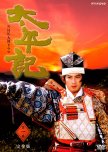I'm writing this review to help those who might be interested in this drama but were put off by the lack of information and confusing poster that might have created a perception that this is a time travel drama while it is not....LoL
If you love Japanese history or culture or both, Taiheiki is a must watch!! It revolved around the time of transitions between three important ancient government systems, namely Kamakura Shogunate, Kenmu Restoration, and the early Ashikaga Shogunate (when there were 2 Emperors in 1 nation).
I never read Yoshikawa's novel or the classic scripts, so I don't know how close the drama is. But in my opinion, the writer did a good job in portraying several aspects of this turbulent era in Japanese history.
One of the aspects is social sentiment, which is how one social class is viewed by the other and sub-sentiment between the same social class. This aspect has been nicely written and would give viewers a sensible explanation on why these 3 political transitions happened in Japanese history.
Another thing that was nicely portrayed is the cultural aspect of the 13th and 14th centuries. If you're used to Jidaigeki's dramas that mostly focused on Sengoku to pre-Meiji eras, this is an opportunity to see the new things.
The obvious one is "Samurai Sword", which is more shorter and slender than the one we know. The building's interior is more open space than the well known compartmental room style. You would also be surprised to see less sliding doors, less tatami mats and even to see windows in the building!! There's also transition in the dance style that would later evolve into "Noh", as well as flower arrangement that is slightly different than the modern one.
Apart from that, Taiheiki was also amazing in terms of characterization as it was based on real life characters. The relationship between Takauji and his brother, as well as his family and people around him was nicely done by the production team thanks to the amazing acting by Sanada Hiroyuki, Takashima Masanobu, Jinnai Takanori, and Emoto Akira among others.
The only downside is that the political systems were not discussed in detail enough, especially the differences between Kamakura system with the new Ashikaga system. The impact on having dual courts (Northern and Southern) was also less discussed due to more focus on Ashikaga's internal conflicts. Some of the wars, especially during few last episodes were only explained through the narration instead of having scenes for them.
If you love Japanese history or culture or both, Taiheiki is a must watch!! It revolved around the time of transitions between three important ancient government systems, namely Kamakura Shogunate, Kenmu Restoration, and the early Ashikaga Shogunate (when there were 2 Emperors in 1 nation).
I never read Yoshikawa's novel or the classic scripts, so I don't know how close the drama is. But in my opinion, the writer did a good job in portraying several aspects of this turbulent era in Japanese history.
One of the aspects is social sentiment, which is how one social class is viewed by the other and sub-sentiment between the same social class. This aspect has been nicely written and would give viewers a sensible explanation on why these 3 political transitions happened in Japanese history.
Another thing that was nicely portrayed is the cultural aspect of the 13th and 14th centuries. If you're used to Jidaigeki's dramas that mostly focused on Sengoku to pre-Meiji eras, this is an opportunity to see the new things.
The obvious one is "Samurai Sword", which is more shorter and slender than the one we know. The building's interior is more open space than the well known compartmental room style. You would also be surprised to see less sliding doors, less tatami mats and even to see windows in the building!! There's also transition in the dance style that would later evolve into "Noh", as well as flower arrangement that is slightly different than the modern one.
Apart from that, Taiheiki was also amazing in terms of characterization as it was based on real life characters. The relationship between Takauji and his brother, as well as his family and people around him was nicely done by the production team thanks to the amazing acting by Sanada Hiroyuki, Takashima Masanobu, Jinnai Takanori, and Emoto Akira among others.
The only downside is that the political systems were not discussed in detail enough, especially the differences between Kamakura system with the new Ashikaga system. The impact on having dual courts (Northern and Southern) was also less discussed due to more focus on Ashikaga's internal conflicts. Some of the wars, especially during few last episodes were only explained through the narration instead of having scenes for them.
Cet avis était-il utile?


 1
1























